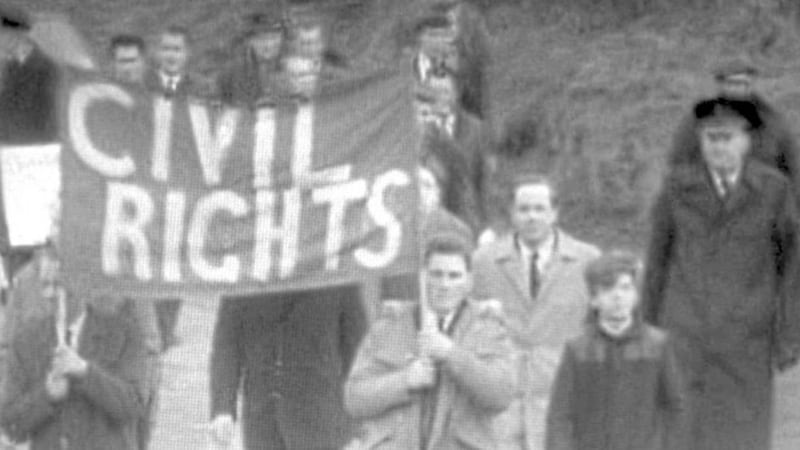Today is the 50th anniversary of the first civil rights march in Northern Ireland - from Coalisland to Dungannon.
It is being marked by both Sinn Féin and the SDLP, albeit by way of an increasingly bitter squabble about who is entitled to claim the credit for the process of change that was kick-started back then.
The DUP has also weighed in: 'Nationalists demanded rights on a number of fronts - jobs, housing and voting were the main campaign grounds - and statutory changes were implemented within months of the campaign commencing in 1968. But the 2018 reality is very different from the 1968 rhetoric. Much of the public sector has a considerable responsibility to carry out in ensuring Protestants get a fair deal in employment. The Northern Ireland Housing Executive is the body responsible for the allocation and maintenance of public sector housing; and Protestants know over a period of decades how difficult it has been to get employment in that organisation.'
Meanwhile, Bernadette McAliskey, who was in the march 50 years ago, was characteristically brutal in her assessment: 'Until we have a human rights act here that enforces in local legislation the fundamental rights guaranteed under the United Nations to everybody regardless of their class, colour, creed, gender, race or political or sexual orientation - or whether they're from a rural or urban area - we're on a hiding to nothing challenging racism and sectarianism. I see people saying we deserve better and they should get to their work. We deserve better. They should bulldoze the place (Stormont) and turn it into an old people's home.'
None of this suggests that there's actually all that much to celebrate. Indeed, it all looks as embarrassing as the day most of the key players were packed into the Whitla Hall in April to celebrate the 20th anniversary of the Good Friday Agreement; against the background of collapsed negotiations, institutions that hadn't met for 15 months and a level of toxicity between the DUP and Sinn Féin that made Boris Johnson and Theresa May look like life-long bosom buddies.
So, has Northern Ireland really changed all that much since August 1968? Well, the former Parliament has gone, along with unionist rule. (And it is worth bearing in mind that it is almost 50 years since there was a unionist-only government in Northern Ireland. Listening to some republican voices you'd be forgiven for thinking that it only disappeared in 1998). A huge raft of new legislation was introduced in Westminster in the 1970s which addressed many of the concerns of both NICRA and the newly formed SDLP. And as early as October 1972 it was made clear that any new government here would be required to embrace power-sharing and an 'Irish dimension.'
But what else has changed? This is still an us-and-them society in terms of the constitutional question; and the constitutional question remains the key factor in determining how we vote. We still, overwhelmingly, live in clearly defined us-and-them areas. We still, again overwhelmingly, educate our children separately. Worse, we have become so delusional that most of the parties pretend that 'shared education' is the same as integrated education.
The middle ground - which I think key players in NICRA would have been keen to see emerge - has failed to materialise. Not once in the past 50 years has there been even the remotest prospect of us doing politics any differently than we have always done it. Alliance chose a poisoned, airless place between unionism and nationalism and has never grasped the fact that it isn't the middle ground. Never was. That's why they're stuck there.
Politically, electorally and socially we are just as polarised as we were in 1968. People, many of whom are worthy and genuine, keep writing to me to tell me that this place 'really has changed' and that I should stop being so gloomy. But when I ask them to explain why this 'change' isn't reflected in elections, social integration, housing integration and education they become remarkably coy and tell me 'it's only the start of a long journey.' Rubbish! Where we are is where we'll stay in terms of unionism and republicanism - even if there's a united Ireland. Why do you think the DUP and Sinn Féin now account for almost 70 per cent of the vote between them? Why do you think there has been no government for 19 months and little prospect of one any time soon - even though a deal would actually be reasonably able to cut if they were so inclined?
The curse of Northern Ireland is that most of what we celebrate are victories - some real, most imagined - from the past. There is little to celebrate right now; and not much to look forward to, either.








